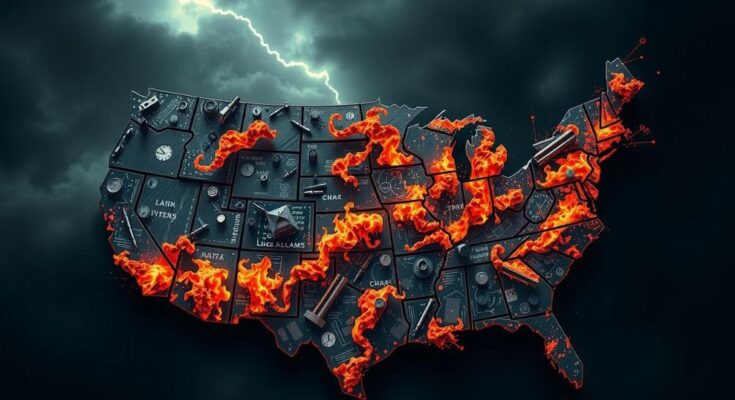The article critiques the notion of American democracy as a deceptive narrative that misleads voters about their choices in presidential elections. It argues that both major political parties act in concert on critical issues, particularly regarding the Israeli-Palestinian conflict, undermining the possibility of meaningful change. The author advocates for Arab and Muslim Americans to remain uncommitted in the upcoming elections as a form of protest against the complicity of both parties in ongoing injustices, particularly in Gaza.
The narrative surrounding American democracy can be seen as a facade—an alluring myth engendered to mislead citizens into believing there exists a meaningful distinction between the dominant political parties. Every four years, citizens are bombarded with proclamations that the impending presidential election is of utmost significance, overshadowing prior elections that were similarly dramatized as pivotal moments in history. This pattern renders the choices offered by the major parties, often classified as opposing paradigms of progress versus decay, no more than an illusion of democracy. In truth, both parties, despite their claimed ideological differences, frequently align on critical issues such as foreign policy and militarization, thus raising a profound conundrum for voters, particularly within Arab and Muslim American communities. Throughout history, as evidenced by the situation in Gaza and the West Bank, both dominant parties have supported oppressive actions that have resulted in loss of life and humanitarian crisis. Leaders from both parties—Donald Trump and Kamala Harris—show little distinction when it comes to the unforgiving policies inflicted upon Palestinian peoples, instead perpetuating a cycle of violence and oppression. The calls for peace and ceasefire have become mere rhetorical tools, wielded to placate growing dissent without any genuine commitment to change. As the election approaches, anxious Democrats seem to be clinging to strategies meant to appease Arab and Muslim constituents, demonstrating a superficial interest in their voices, only to revert to blackmail tactics when pressed. The suggestion that these voters must align with the Democratic faction to prevent the rise of a more oppressive regime undermines their agency and disregards the complex reality faced by these communities, who have historically been marginalized and targeted. It is imperative for Arab and Muslim American voters to exercise their choice not by yielding to the pressures exerted by politicians promising hollow assurances, but by opting to remain uncommitted. The reasoning behind this stance is rooted in the necessity to reject both parties’ complicity in the ongoing tragedies of war and genocide. In light of this, many argue that withholding support for either candidate could serve as a powerful act of resistance, sending a clear message that tolerance and injustice will no longer be tolerated. Ultimately, the context of American politics reveals a harsh reality; the promises of a democratic ideal are but a myth that unravels under scrutiny. Arab and Muslim Americans are encouraged to take a stand for their values and resist attempts to silence their dissent. With the endurance shown amid political adversity, there is hope for a future where issues of justice, particularly for Palestinians, can be advocated genuinely and without subservience to a failing political system.
The examination of American democracy reveals a critical perspective that views it as an illusion, a concept that has historically been employed to manipulate voters into believing they have meaningful choices within a two-party system. This framework posits that elections are framed as monumental turning points while overlooking the continuity in political agendas, particularly in matters concerning foreign policy. The present situation in Gaza serves to highlight the complicity of both parties in perpetuating violence and suffering, specifically toward Palestinian communities, which raises significant ethical concerns. Understanding the historical treatment of Arab and Muslim Americans as marginalized groups further contextualizes the urgency of advocating for justice and accountability amidst pervasive political rhetoric that often amounts to empty promises.
In conclusion, the call for Arab and Muslim Americans to remain uncommitted in the upcoming elections underscores a vital stand against the entrenched paradigms that perpetuate oppression. By rejecting the superficial appeals from both dominant political parties and asserting their agency, these communities can highlight the dire need for genuine advocacy for Palestinian rights. The myth of American democracy, when scrutinized closely, reveals itself as a complex narrative that demands reflection and action, with the potential outcome resting in the hands of informed and resolute citizens who prioritize justice over political allegiance.
Original Source: www.aljazeera.com




